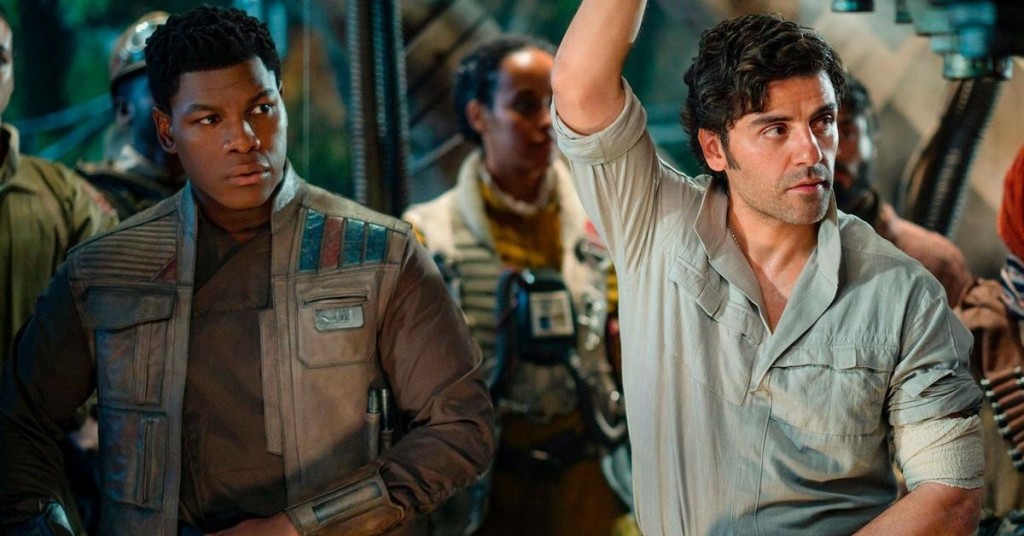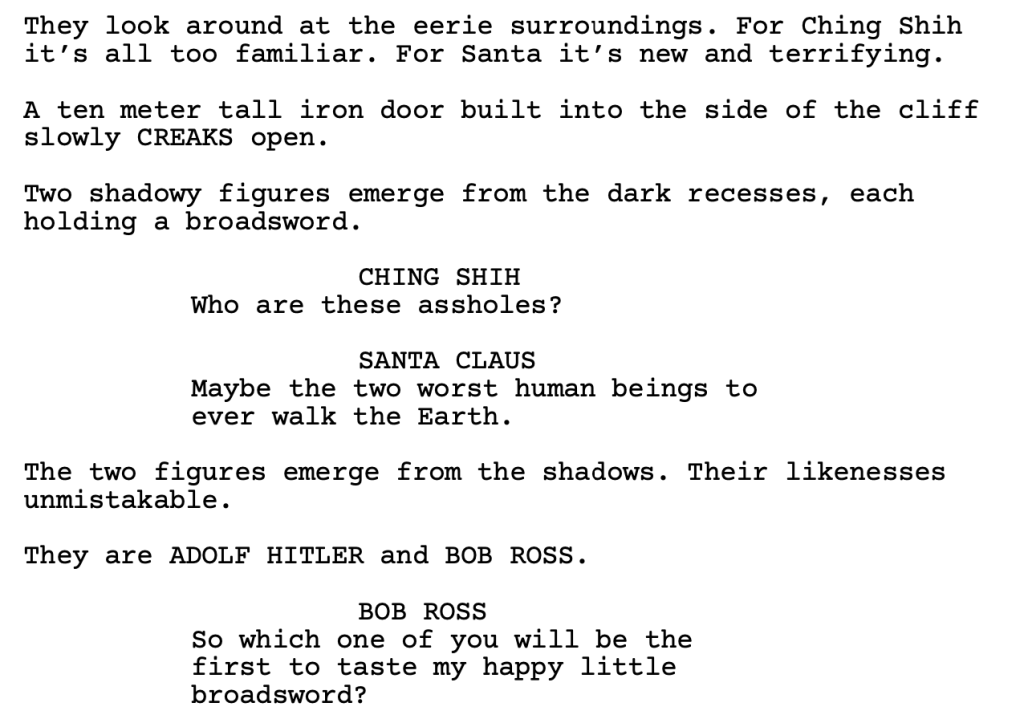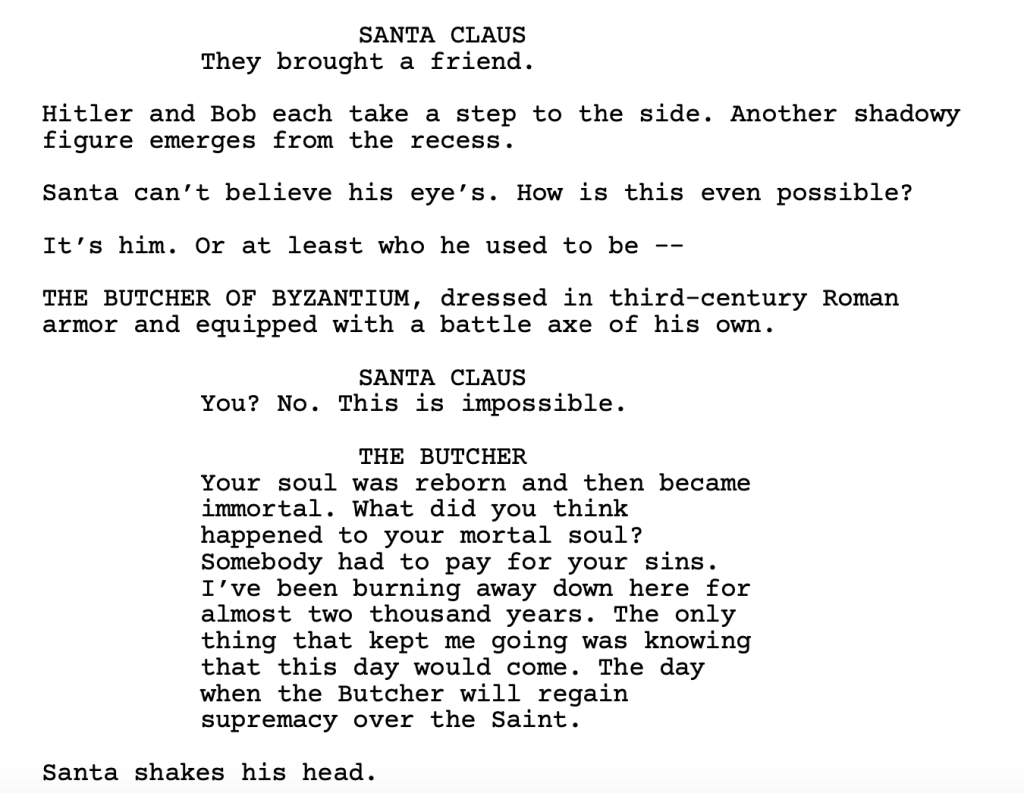CHECK YOUR INBOXES!
Your SPAM folders and PROMOTIONS folders. The Scriptshadow Newsletter should be there.
This newsletter is awesome. I talk about the end – the END – of the Star Wars saga and where they go from here. I take on my five FAVORITE and my five LEAST FAVORITE movies of 2019. I give some personal shout-outs to the breakthrough Scriptshadow amateur screenwriters of the year. I give some thoughts on the latest trailers, including Christopher Nolan’s latest. And I review one of the top 3 biggest spec sale scripts of the year. Is it everything, all of that, and a big ball of lettuce wrapped into one? Only way to find out is to read the newsletter.
If you want to read my newsletter, you have to sign up. So if you’re not on the mailing list, e-mail me at carsonreeves1@gmail.com with the subject line, “NEWSLETTER!” and I’ll send it to you.
p.s. For those of you who keep signing up but don’t receive the newsletter, try sending me another e-mail address. E-mailing programs are notoriously quirky and there may be several reasons why your e-mail address/server is rejecting the newsletter. One of which is your server is bad and needs to be spanked.
Okay, so Scriptshadow is closing down for the holidays. I’ll be back on Monday January 6th with a GIGANTIC announcement. This is a big one. I’d even say world-changing. Also, I’m going to get a final 2019 Newsletter out. That should be coming this Friday. I’ll post here as soon as I send it out in case it slips into your Promotions folder. To give this post some sense of a theme, feel free to share your favorite movies of the year. I have two more I’m dying to see (1917 and Uncut Gems). Merry Christmas, Happy Holidays, and have a wonderful new year everyone!!!
Genre: Sci-Fi/Fantasy
Premise: Rey, Poe, and Finn must come together to find the evil Emperor and stop his “Final Order” plan to take over the galaxy.
About: It’s finally here! After many many months, the much talked about “final Star Wars film” has hit theaters. Already, there are mumblings of “failure.” The movie made 175 million this weekend, which is 25 million less than predictions. Last Jedi made 220 million its first weekend. Force Awakens made 247 million. It will likely be the nail in the coffin for Kennedy, who never really understood the franchise, resulting in numerous missteps. But none of that has anything to do with whether the movie is actually good. Is it? Let’s find out!
Writer: Chris Terrio/JJ Abrams (George Lucas)
Details: 2 and a half hours long
Duh duhhhhhhh duh duh duh DA da. Duh duh duh DA DA duhh duhh duhh duhhhhhh!
SPOILERS DROID: “BEE-BEEEP BOOOOP SPOILERS BELOW, I HAVE SPOKEN”
I’m hopped up on Sudafed, Advil, and Vitamin C so WATCH OUT! You’re about to get a review for the ages.
I’m going to get right into it.
I LOVED THIS MOVIE. Absolutely positively loved every second of it. There is literally nothing I disliked.
And let me take a quick detour because there’s something going on on the internet that’s infuriating me. Tons of Youtubers realized that they got 10x as many views as they’d ever had on any video when they trashed The Last Jedi. It’s not hard to figure out how those same people are going to approach their reviews for this movie. “Money or truth? I’m going with money, buster!” This is why you see so many Star Wars reviews on Youtube that say, “WORST MOVIE EVER!” and “A CATASTROPHE!”
I have no issues with people who disliked this movie. But if you’re going to try and convince me it’s the worst movie ever or “a catastrophe,” I’m going to tell you you’re a straight up liar. This movie was one of the most entertaining movies ever made. And there’s no way you didn’t have at least a little bit of fun watching it.
My viewing experience started off confusing because I’d heard all these reviews saying that the first 45 minutes were awful and confusing. The first 45 minutes were great (LIGHT SPEED SKIPPING!) I kept waiting for them to get bad and waiting for them to get bad and they never did. A lot of people were confused by the multiple McGuffins, Sith planet finders and daggers – but all of that made perfect sense to me. It’s a hidden planet so they’re going to have to go on a galaxy-wide hunt to find it. Duh.
From there, it only got better. And it started with Rey and Kylo. I was lukewarm on Rey in Force Awakens. I straight up despised her in Last Jedi. But here, she’s awesome. There’s so much conflict within her in every frame. She really earned the title of strongest Jedi in the galaxy through this movie.
And Kylo, who’s always been a great character, was at his best here. I loved how JJ and Terrio advanced the “Force Skype” power so that objects could travel between them. I thought that was well set up and it was also well paid off. And I loved the chemistry between the two. I’ve been a little weirded out over the Reylo fan fiction stuff online but by the end of this movie, I was rooting for it. And I was one of the people clapping when they kissed.
Now when it comes to “the group” (Rey, Finn, and Poe) and how a lot of people turned on Rian Johnson for splitting them up, I was never in that camp. In the second movie, you have to split everybody up so that the audience wants to see them back together again. Could Johnson have done it like Empire and had them together at the start and also at the end? Sure. But then you risk looking like you copied Empire. So that didn’t bother me. What bothered me was that Finn’s mission was dumb and Poe’s was lame.
However, now that I see how much chemistry these three actors have with each other, I agree with everyone else. You needed to put these three together in as much of the trilogy as possible. They’re the reason this movie was so fun. Their dialogue was funny. Their action scenes were great. They’re people you want to be around ,you want to be friends with. I think writers forget that simple tip. Give us characters we’d want to be friends with in movies like this.
Yet another accomplishment is that I’ve never seen a movie this long that plays this fast. We are SCREAAAAMING through this plot. Someone said online that the movie takes place over 16 hours of time? That was another strong choice by JJ. He knew he was in a desperate situation coming off the plot mess that was Last Jedi. So he went back to one of oldest screenwriting tricks in the book – KEEP IT MOVING. Make sure characters always want something whenever we come into a scene with them. Make sure they want that something NOW. Not at some later date. If you’re cutting between 3-4 storylines with that kind of pace, your movie is going to move.
A lot of people are upset about the fan service. Not me. I loved every single fan service moment. I liked Harrison Ford showing up. No idea that would happen! I liked the callback of Kylo saying he needed to do something but didn’t know if he could do it then throwing his lightsaber away (he needed a new one anyway – that one was too cumbersome), I LOVED Luke catching Rey’s lightsaber and telling her to hold onto it. The highest profile “FU” from one director to another we’ll ever see. I loved that Luke was happy again! That we finished Luke’s character on a happy note. I loved that he levitated the X-Wing like Yoda did. Awesome.
And I loved the new stuff too!
BABU FRIK!!!
My biggest laugh in the theaters this year was C-3P0 saying, “Hello, my name is C-3PO, human cyborg,” and Babu Frik’s nearly throwaway line, “Hello, I am Babu Frik.”
I loved D-O. Wish there was more of him. Zori Bliss didn’t get enough time but her and Poe had great chemistry together. You know something is working when a character gets three minutes of screen time mid-movie and then comes back in the end, has an interaction with another character 40 feet away with no dialogue, and it gets a big laugh (Poe motioning if there’s any chance for that kiss – her shaking her head, nope!) .
I want the Adventures of Baby Yoda, Babu Frik, and D-O on Disney Plus. Robert Iger, are you listening???
The Emperor.
A lot of people have a problem with The Emperor in this movie. If you have a problem with The Emperor, blame Rian Johnson. He’s the one who killed off the big baddie and left JJ with nothing. So he did the only thing he could do. He brought back the biggest bad guy of them all. This is also the genius of JJ. Six months ago, we thought we were watching the first trailer for Rise of Skywalker at D23. Wrong. JJ had one objective and one objective only with that trailer: GET PEOPLE USED TO THE IDEA THAT THE EMPEROR IS BACK. If he would’ve sprung that on us in the movie itself, it wouldn’t have worked. We heard a million times over that the Emperor was coming back so it didn’t take long to get used it. I bought it right away. That’s part of Star Wars’s secret weapon – the opening crawl. You can throw something in there (“THE EMPEROR IS BACK!”) so that we can get into the story right away.
I LOVED THE JEDI HUNTER WHO WAS AFTER LUKE! I want to see a whole movie about him.
I LOVED THE KNIGHTS OF REN!!!
I loved the cheesy line when they pass the stormtroopers. “Knights of Ren. Cool.” That’s what Star Wars was missing in Last Jedi – Star Wars humor. Cheesy but fun dialogue. There were so many spot-on Star Wars humor jokes. Like Poe hopping in between Rey and Finn, “When do you want to talk about it? When Poe isn’t around?” Nobody called the First Order up and pretended to have a bad phone connection and then made ‘your mom’ jokes in this movie. This movie, more than ever, highlighted why Rian Johnson was so bad for Star Wars.
General Hux! I loved that JJ gave him a big moment cause he’s another character who got screwed in Last Jedi. He became so unimportant that JJ had to introduce a new ranking character above him to be scared of! So I love that Hux was the spy.
The Snoke reveal was a little weird. But it kind of made sense to me. The Emperor is extremely manipulative. He is the ultimate puppet master. He’s creating things to pull Kylo’s strings. Do I think JJ planned for Snoke to be the Emperor’s clone all along? No. But JJ and Terrio did the best they could with what they were given. And that’s another thing I loved about this movie. JJ addressed everything. He made sure that Star Wars fans felt heard. That’s something the previous director had no interest in which is why so many people dislike his Star Wars vision.
I actually think this movie could’ve been EVEN BETTER if they weren’t hampered by the late Carrie Fischer footage. They really had to stretch all believability to get any sort of cohesive storyline out of that. The fact that they made it work is another feather in JJ’s and Terrio’s caps. They were burdened with such a difficult task and they somehow, some way, pulled it off.
There was only one missed opportunity and that’s when Rey was down in the Emperor’s room and she heard all the whispers of Jedis from the past. They should’ve put all the force ghosts in there. Not just one or two. But 30. 50. I heard they were thinking of doing this but scrapped it and I suspect that they wanted this to be about Rey overcoming this moment and not Rey plus 50 other people. That’s an old screenwriting trick. If it’s possible to have your hero save the day, have your hero save the day. The only time you want multiple people helping your hero in the climax is if that’s part of the theme. For example, wasn’t the theme “friendship” or “togetherness” in Guardians of the Galaxy? So there, it made sense that they all came together to defeat the bad guy.
Someone on the internet said it best. This is the Star Warsiest Star Wars movie ever made. If you love Star Wars, you will love this movie. It’s so darn fun and it makes you feel so darn good. I left this movie on a high unlike any movie this year. I’m not going to go so far as to say it’s the best movie of the year. That’s Parasite for me. But it’s up there. This is the epitome of how to make a crowd-pleasing blockbuster.
Babu Frik!
[ ] What the hell did I just watch?
[ ] wasn’t for me
[ ] worth the price of admission
[x] impressive
[ ] genius
What I learned: If characters work well together – if they have good chemistry on the page – that’s a rare thing and therefore something you want to take advantage of. Even if you have characters that you didn’t initially create a bunch of scenes for, once you identify that their scenes sparkle, write more scenes for them. That’s what I learned here in regards to Rey, Poe, and Finn.
What a wonderful and unexpected Christmas present. An amateur script that gets an IMPRESSIVE!! Christmas is really here script readers!!!
Genre: Christmas, Action, Fantasy
Premise: When his elves are kidnapped by the Devil to make planet-conquering toys for the naughty, the only way Santa Claus can save Christmas and the world is by pulling off the rescue mission from Hell.
Why You Should Read: First off – Yes, my real last name is Christmas, but that probably isn’t going to be enough to earn me a spot in this year’s Holiday Showdown. Luckily I have a killer concept to go along with my festive surname. Seriously, why isn’t this a movie already? It’s such a simple premise – the elves get kidnapped, and Santa has to rescue them. It’s Taken with a festive-fantasy twist. Surely, I couldn’t be the first person to think of this. Well, while researching Santa Claus movies, not only did I find out that nobody’s ever explored this premise, but I also discovered something shocking. Of the over 95 movies about old St. Nick, for some reason, almost all of them are told through the point of view of some entitled little brat drowning in first-world problems or one of Santa’s overly ambitious helpers who defiantly took the short-bus to toy-making school. And for some reason, it’s always one of these two knuckle-heads that end up rescuing Santa and saving Christmas. What the hell are we doing, people? After all the joy he’s brought to the world, can we not even let Santa be the hero of his own damn movie? Well, Jingle Hell Rock will fix all that and if you guys have 1/10th of the fun reading it as I did writing it, then you are all in for a very Merry Christmas. God bless us, everyone.
Writer: Reggie Christmas
Details: 87 pages
This.
Script.
Is.
Hilarious.
And it had a pretty steep mountain to climb to get me onboard. Because as funny as I thought this logline was, I’ve seen so many outrageous loglines like it fall by the wayside within the first five pages of the script itself. It seems as if the wackiest ideas are accompanied by the most undisciplined writers. Or writers who haven’t been writing long enough to realize that a wacky concept doesn’t write itself. It’s way harder to write than a sensical concept because sensical concepts at least make sense. Where screenwriters get lost is when they’re offered too many options. And wacky no-holds-barred stories don’t have any parameters, which is why it’s so easy to steer them off the rails.
Jingle Hell Rock isn’t like that at all. This script is surprisingly disciplined. And CLEVER. There’s a lot of funny clever comedy here that, quite frankly, surprised the sh#t out of me. I cant’ wrap my head around the fact that a writer not only came up with this idea. But actually put in the work to make it good. It’s too bad this script came out today because it would’ve made the Black List for sure. It’s certainly better than “Move On.” So what’s it about?
We start at the North Pole on Christmas – Santa gone for the night – with elves walking the perimeter strapped with machine guns. Just over the hill, a bunch of Satan’s demons are lying in wait. Without warning, they storm the village, killing the guards and taking all the toymakers. When Santa comes back, he learns they’ve taken the toymakers so that Satan can make toys for the naughty!
When Santa sees the speculative future of the planet should naughty kids be rewarded (it’s bad), he knows he has to go to Hell and stop Satan. But he can’t do it by himself. So first he recruits 6th century pirate Ching Shih. She’s also the only person to have escaped from Hell and made it to Purgatory. It’s not easy to convince her, but after giving her a special gift, she’s in.
And now Santa must recruit his most difficult teammate – Krampus. Krampus and Santa have a complicated past, dating back to when they used to work together and Krampus would handle the naughty kids. But Santa felt punishment wasn’t right for Christmas and ditched Krampus. He’s hated Santa ever since. But now Santa offers him the chance of a lifetime. After they kill Satan, they’ll need someone new to run the place. That someone can be you, Santa tells him.
Off to Hell they go, where Santa is shocked to see Krampus turn on him! He was playing for Satan’s team all along. Rats. Satan sends Santa and Ching into the dreaded PIT OF ANIMA DANNATA, where the only way out is facing the Custodians. In a scene reminiscent of the climax in Ghostbusters, Santa will have to take down the last person he expected, someone he’s been running from for over 16 centuries. Who? You’ll have to read this great script to find out!
Let’s start by dealing with the elephant in the room.
It would be impossible to make this. It’s so freaking crazy. And it’s not that crazy stuff can’t be made. But the crazier your script is, the cheaper it has to be, not the more expensive. There are people in Hollywood who like to make weird stuff, yes. But there’s a dollar number they won’t go past if a project is too risky.
Ask yourselves, what’s the riskiest big-budget movie that’s been made in the past 10 years. Something where the filmmakers were legitimately taking huge chances and the movie cost over 100 million dollars? Maybe Passengers? And that wasn’t nearly as crazy as this is.
But maybe – MAYBE – a streamer would take a chance on this. Maybe if you did an animated version of it? Or what might be funny is if you did it in the old school clay stop motion animation style they used for Frosty the Snowman? Or maybe there’s just some crazy rich dude out there who would want to make it and you’d hire Reggie to do what they did for the original Matrix script where they got rid of a few expensive set pieces.
Anyway, let’s get to the script.
There’s so much funny and clever here, I don’t know where to start. Everything from the description (describing Satan’s new sleigh: “Balthazar smirks as he removes the tarp to reveal — A demonic SLEIGH. Forged with iron and hate.”) to the dialogue: SANTA CLAUS: Who are the Custodians? CHING SHIH: We won’t find out until we make the wager. SANTA CLAUS: Who were they when you last fought them? CHING SHIH: Genghis Khan, Vlad the Impaler and a Spartan General… I don’t remember his name. SANTA CLAUS: Leonidas? CHING SHIH: I said I don’t remember. SANTA CLAUS: Was it Gerard Butler’s character from the movie Three-hundred? CHING SHIH: I don’t know what movies or Gerard Butlers are.
…to the set pieces themselves. I think that’s what surprised me the most. This isn’t the first time I’ve read a script about soldiers going to Hell to take on Satan. One of the problems with that script was – well, there were a lot of problems – but I remember the set pieces being fuzzy and unclear about the objective and what was going on onscreen.
Every set piece here is very clear. We know the hero’s objective in the scene. We know what’s standing in their way of it. The geography of the scene – often overlooked – is clearly laid out on the page. I remember reading that Hellified script and never having a clear idea of what I was looking at. Good writers make all of that stuff crystal clear so the only thing we have to worry about in a scene is enjoying ourselves as opposed to trying to figure out who’s where and what they’re doing and why we’re here in the first place.
And did I mention the script was CLEVER! Reggie threads in this killer backstory of the Butcher of Byzantium, which is who Santa Claus really was at one point in history. He was this soldier who killed a bunch of people. He just got re-worked and repurposed over the years into this happy jolly figure (Satan reveals this news to Santa’s #1 Helper, Bobo – BOBO: “That was all before his conversion. He’s not like that anymore.” SATAN: “You think twenty-first-century cancel culture gives two shits about stories of redemption.”)
But the sequence that said, “someone HAS to take a chance on this” was the Pit scene. It occurs after Krampus double-crosses them (by the way, you know a script is working when even obvious twists, like Krampus double-crossing Santa, surprise you). That’s when they get thrown into PIT OF ANIMA DANNATA and they’ve got to fight their way out. And Santa is asking Ching how she got out of here before. She explains that they have to defeat the three Custodians. Here’s what happens next…
It’s such a great nod to Ghostbusters without being lazy. This is a choice that feels organic to this movie. And it would be awesome enough. But then the third person arrives.
Sure, you could’ve brought another goofy character in there. But instead, Reggie makes the more interesting choice and wheels in the last person Santa wants to see. The pure evil that he used to be. That’s REALLY GOOD screenwriting there, guys. I don’t see thoughtful writing like that in scripts often.
And Reggie gets the little stuff right as well. When Santa and Krampus have to go find some weapons in the real world, there’s this moment where they’re walking down a busy street with a lot of people around. And the people are all staring at Krampus. Krampus, by the way, is a tall blue demon creature with horns. So a savvy reader is thinking, “a blue demon can walk down the street and all he gets are stares?”
But here’s the quick exchange that occurs between Santa and Krampus. SANTA CLAUS: “I thought you could use magic to make normal people see you in human form.” KRAMPUS: “I am. But even in my human form, I’m one ugly son-of-a-bitch.”
Now the screenwriting newcomer is going to look at this exchange and think, what’s the big deal? I’ll tell you what the big deal is. In 99 out of 100 amateur scripts, the writer would have awkwardly drawn attention to this exchange in order to clumsily convey the relevant exposition that Krampus is using a spell to make himself look human to the world. Something like: “These people can’t see me, remember. I’m using my human form right now.” By doing it Reggie’s way, we’re not even aware that it’s been explained to us why a tall blue demon can walk around in a city and nobody says anything. It’s truly invisible exposition, which is the mark of a skilled screenwriter.
And there’s so much more here, guys. I almost want to go back and read it again (which I NEVER DO with Amateur Friday scripts because I’ve mentally moved onto the weekend) just because I wasn’t giving it the benefit of the doubt initially. Now that I know Reggie brought the goods, I’m sure I missed a handful of clever and funny moments.
You still have to figure out how to get this thing made. That’s a giant challenge, probably more difficult than killing Satan. But if there’s someone out there with money and eclectic taste, this is one hell (no pun intended) of a fun screenplay. Something all the readers of Scriptshadow should unwrap this Christmas and check out!
[ ] What the hell did I just read?
[ ] wasn’t for me
[ ] worth the read
[x] impressive
[ ] genius
What I learned: No matter how wacky your premise is, Jingle Hell Rock proves that you level up your script when you inject a personal internal battle into it. The most surprising thing to me about this script was Santa having to take on his former evil younger self. It was well set up. There was a commitment to the storyline (it wasn’t lip service). These things matter to readers who are so used to reading surface level forgettable garbage all the time. It took this script to another level.
Best easter egg: Nothing to learn with this tip. Just an added star for actually working a “McClunkey” line into this script. Bravo!
Tis the end of the year and that means it’s time to break down the 2019 box office! At first glance you see a bunch of Disney movies and think, “The only lesson here is that Disney is taking over the world. Why write anything anymore??” But if you go deeper, there are lessons to learn. And let’s not forget that there’s a whole new outlet for spec writers to sell scripts called Netflix. Netflix is obsessed with 20-something rom-coms (To all The Boys I’ve Loved Before), Christmas films, and high-concept comedies (Murder Mystery, any Adam Devine vehicle). They’re not afraid to make big original action movies like Triple Frontier, Bright, and Six Underground. And they even dip their toes into serious stuff, like Extremely Wicked and Private Life. If you’re only concerned with getting your spec script sold and made, you should be meticulously charting the movies Netflix is making.
When it comes to traditional box office, however, spec scripts should be seen more as an interview to get in the game. If you want to be the next writer on Mission Impossible, write a script that indicates you would be a good choice to write the next Mission Impossible. Pro tip, though. Don’t write a Mission Impossible clone. Give us a memorable concept with strong character development inside a kick-ass story. For example, Chris Terrio broke in with his script, Argo. On the surface, Argo was a serious film about slipping into Iran and saving a group of stranded Americans. But the film was ALSO about using a FAKE STAR WARS MOVIE as a ruse to get into the country. Well guess what film Chris Terrio just wrote. Rise of Skywalker! I GUARANTEE JJ saw or read the Argo script and that stuck with him when he was trying to think of who to hire.
So let’s take a look at the Top 20 domestic earners of the year:
Again, if you’re looking for spec script successes, this isn’t an encouraging picture. Disney has the top 4 movies, 6 of the top 10. And those numbers are going to jump to 5 and 7 once Rise of Skywalker finishes its run. For Disney haters, take joy in the fact that not all of their films hit. Dumbo and Malificent were big bombs for the Mouse House. Even though they have the tippy-top marketing geniuses in the world, they still make mistakes.
Get Disney out of your mind. I want you to focus on the number 8, 10, 11, and 12 movies. “Joker” is based on a famous comic book character, yes. But it doesn’t have a single super hero set piece in it. It’s pure character exploration. By the way, I say character “exploration” instead of “development” because it’s easier to explain what you should be doing. You should be EXPLORING everything that’s going on inside your characters. That simple strategy resulted in a billion dollar worldwide gross. What this tells me is that audiences are hungry for character explorations based on known intellectual property. So while you don’t have access to The Joker because he’s WB’s IP, you do have access to older famous characters, such as say, Jack the Ripper. Could you write a story that humanizes that character? That shows us how he became who he became? It would have to be good of course. But Joker’s surprise mega-success proves that there is an appetite for scripts like that.
“Us” is a writer-director project coming off of a massive hit from that writer, which influenced everything from how much money they put into the marketing to fans of Jordan Peele eagerly awaiting the film. But, as a spec screenwriter, this is the kind of stuff that should excite you. If you write Get Out, you get to write another original script. Another thing to take into account here is that “Us” wouldn’t have been made first. It wasn’t as clean or as cheap or as high of a concept as Get Out. So when you’re picking your next script to write, make sure you’re writing the one that has the best chance at getting made and not that “almost good idea.” “Almost good ideas” are fine once you’ve had a hit. But they never get you that breakout opportunity.
Fast and Furious and John Wick are both action genre sequels to original properties. It is still possible to break in as a screenwriter with an action script. However, action is tricky, as we learned during the Amateur Action Showdown week. The difference between cliche and ‘just original enough’ is as gray as a February Chicago morning. Nobody reads John Wick and thinks, “JACKPOT.” And yet jackpot is exactly what it was. The original Fast and Furious used the age-old cliche setup of pairing an undercover cop with a criminal.
When writers come to me with similar concepts, I always tell them, you have to work harder. This isn’t original enough. And yet, unoriginal action concepts (like Wick and Furious) break through occasionally. My advice is to control what you can control. If you can come up with a snazzy action concept, do it. If you can build more character development (exploration) into your action heroes, do it. If you can come up with a really strong plot that stays ahead of the reader and has couple of genuine surprises/twists, do it. The trick with this genre seems to be that, with all of the scripts feeling the same, you have to do all the little things better than the next guy.
Now let’s look at films 21-40. The casual moviegoer writes these off. They only care that Endgame made 2 billion dollars. But as a screenwriter, you should be obsessed with this block of films. 2019’s 21-40 is basically 1992’s 1-20.
Let’s start with 21, 23, 25, 26, and 29.
All of these are scripts you could’ve written on spec and gotten a Hollywood producer interested in. Yes, Glass was a sequel. But it’s based on original IP with unique characters and a high-concept premise. I still think there are avenues for writers to exploit budget-friendly non-traditional superhero concepts like Glass. There’s that spec that sold recently about a heist into a superhero’s house. There was that admittedly awful James Gunn superman horror film. Stuff like that will get made. You can also switch the genre up. Satire, comedy, thriller. Play around to find a superhero genre combo that nobody’s seen before.
The Upside is a bit of an anomaly in that it’s a remake of a foreign film and a genre (drama with mild comedic elements) that doesn’t traditionally do this well. So I’m not sure there’s a whole lot to learn from it. However, I will say that actors love challenging roles like playing a paralyzed man, which is why, no doubt, Bryan Cranston signed on. And comedy actors love playing serious roles, which is why Kevin Hart signed on. Once you hook a big actor, your movie WILL get made. So it’s good to have that in the back of your mind when you’re creating a concept. Ask yourself, “Are the characters in this script interesting?” Cause if they aren’t, chances are no actor is going to be interested. Even something like Ad Astra, which is a big sci-fi film, needed to make Brad Pitt’s character autistic to get him onboard (at least in the script that was the case – I don’t know if they stuck with that in the movie).
Hustlers speaks to the power of generating lots of unique scripts. Lorene Scafaria was a mainstay on the Black List for a good five years, belting out scripts like Nick and Norah’s Infinite Playlist and Seeking a Friend for the End of the World. She was the biggest “quirky” female writer in Hollywood back then and her unique voice got her a lot of fans. So when she put Hustlers out there, people got behind it, she got a good cast, and the next thing you know, she’s got the most surprising breakout film of the year behind Joker. Keep writing, find your voice, get better each script, and good things eventually happen.
I don’t know much about Ford vs. Ferrari but I know any writer could’ve written this script. Nobody has the rights to this idea. I also know that “VS.” movies are an underrated sub-genre. When you see “vs” what’s the first thing that comes to mind? Conflict. So conflict is built right there into the title! Add a known entity on each side of that “vs” and you’ve got yourself a movie idea. There have been lots of highly publicized battles throughout history. Find your VS. and you might have a hit movie.
It’s hard for me to write about Rocketman (or its 2018 cousin, Bohemian Rhapsody) because I’d rather rip my eyeballs out with an ice cream scooper than watch one of these movies. But the proof is in the pudding. Music biopics will never go out of style. I still think that you need to be clever about how you approach them, though. Anybody can write a biopic about Jimmy Hendrix, which is why any sane producer will say, “Why would I buy a straightforward Hendrix biopic from you, nobody writer, when I can hire a legit writer to do the same thing, but a lot better?’ However, if you’ve found a fresh angle into a Hendrix story, someone has to buy your specific script to make it. For example, if you write a script about the 10 crazy hours leading up to Jimmy Hendrix’s performance at Woodstock, that indicates more of an artistic creation on your end than a straight forward Wikipedia adaptation.
Finally we have 31, 33, 36, 38, and 40.
I saw Good Boys recently and it’s a surprisingly good movie. They marketed it as “sixth graders swearing,” which I suppose they needed to cause it’s a simple way to get the average moviegoer interested. But it’s actually a heartfelt movie about friendship. Regardless of that, this is the highest grossing straight comedy of the year. And it shows that with comedy being folded into comic book movies and television streaming, you need to think a little more outside the box than the latest Will Ferrell or Melissa McCarthy vehicle. And, as I’ve always said, irony does wonders for a comedy premise. If this was rated PG-13, I don’t think it makes money. The “R” rating sets up the irony of little kids being vulgar and outrageous.
Knives Out. This movie had a lot working against it. The name “Rian Johnson” doesn’t exactly inspire a united front of positivity. And yet it made a ton more money than any of Johnson’s other films that didn’t have Star Wars in the title. Something to keep in mind here is that putting a bunch of unique characters in a contained situation is a great starting point for a story. Cube. Murder on the Orient Express. Bad Times at the El Royale. Escape Room. It doesn’t guarantee a good movie by any stretch. But it remains one of the most exciting setups for me as a reader.
I’m not sure what to make of “Yesterday.” It feels like a concept from yesterday, as in 1997 yesterday. I’m encouraged that there’s still an appetite for big ideas that don’t fit into any traditional mold other than being high concept. I wish we had more movies like that. And I think the reason this one broke out above any other high concept idea in years is that they took the idea seriously. They didn’t wink at the audience and say, “We know this is ridiculous but go with it anyway.” They went all-in and it made the story feel like it mattered. Something to keep in mind if you’ve got a high concept idea you’re writing yourself.
Zombieland Double Tap is a huge hit… if it was made in 2011. Fans only wait decades for sequels when the product is iconic. They don’t wait 10 years for Zombieland 2. However, the original Zombieland remains one of the best examples of how to mix horror and comedy, which is a genre that, when done well, can become a monster hit. But you have to be ahead of everyone else. You gotta be doing things that other writers aren’t doing. I remember Columbus spewing out the hilarious “rules” of how to survive a zombie apocalypse in that first script and thinking, “this is a cut above.” There’s an opportunity for a writer to take the next horror trope, mix in some smart comedy, and write a breakout script. Maybe it’s you.
Finally, we have “Angel Has Fallen.” Yes, it’s a sequel. But it’s a sequel from a project that began as a spec script. As Scott has documented extensively in the comments, this is a sequel that needed to lower its budget so they axed their earlier ideas and focused on a smaller scale character-driven script. And this is something any writer can do. Very few producers have access to the 120 million dollar floor it takes to write a 3500 screen action film. So if you can find an angle that’s more contained with a heavier focus on a hero who’s going through sh%#, do that. It’s actually a great equation to work with. For every theoretical 10 million dollars you have to cut from your script, try to make your action hero twice as interesting. I mean that’s why Joker was so successful. It’s not even an action movie but they stuffed so much into that character that we couldn’t look away from him.
Finally, for those of you who want to be up with the latest trends, this was supposed to be the year that kicked off the social thriller. The Hunt was set to begin that trend before the internet said, ‘oh no you dihint.’ So expect 2020 to be the year of the social thriller instead. I have no idea how audiences will respond. If The Hunt is any example, it should be interesting. But this is definitely a genre producers and managers will be looking for.
Share your thoughts on this year’s box office in the comments section!














